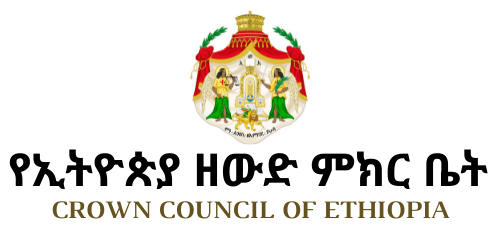From the President of The Crown Council of Ethiopia, His Imperial Highness Prince Ermias Sahle-Selassie Haile-Selassie, as Ethiopia Marks a New Government and a New Year
His Imperial Highness Prince Ermias Sahle-Selassie Haile-Selassie, President of the Crown Council of Ethiopia, in sending heartfelt greetings for the New Year of 2014 which Ethiopians recently celebrated, has asked for reflection on the creation today of the nation’s new Government.
He noted: “Ethiopians did their duty on June 21, 2021 and voted in national elections, the first struc-tural move toward democracy since the coup almost five decades ago against the Emperor moved us from the path of progress. Today, even as the nation suffers from drought and the tragedies of communal fighting, made worse by grave international interference, we have brought forth a new Government which more closely mirrors the pub-lic will.”
“As with all governments in all democratic societies, there are challenges and there are those who did not see the results they wanted. But we have seen our nation, which has so many more regional and other unique facets than most societies, move along the path of accepting a process whereby we can see the will of the majority reflected and we can see a path for future peaceful changes through the ballot box.”
He continued: “As I noted when the Crown Council urged Ethiopians to participate in the elections, we have en-dured so much since the coup which occurred 47 years ago, and we cannot afford to allow our beloved Ethiopian family to fall into even worse suffering and ignominy. I asked us all to come back together because there was no other way for us to rebuild the greatness of purpose which has guided us for more than three millennia.”
“Today, as our New Year of 2014 shows its early light, we have indeed moved forward, despite what, to the out-side world, must seem like overwhelming odds. We must take heart in this. We can now see that our future is com-ing back into our hands. We must welcome the reality that we have a newly-elected Government sworn into office, and give the Prime Minister and Government the support and space to do what they have been elected to do.”
Prince Ermias concluded: “Let me repeat what I said earlier; that the Crown Council offers all of its services to help resolve the disputes over the future management of our great Nile River which Ethiopians truly see as a re-source for humanity over which they have been given great responsibility. This is, in fact, an issue which we can see as the cornerstone of a Grand Bargain, worthy of an Emperor Haile Selassie or an Anwar as-Sadat, to bring prosperity to our entire region.”
“Again, my fellow Ethiopians: Congratulations on creating our new Government. We can take great hope and pride in this first step. We are Ethiopian and proud of our great history. God Bless You in this New Year. God Bless Ethiopia.”




